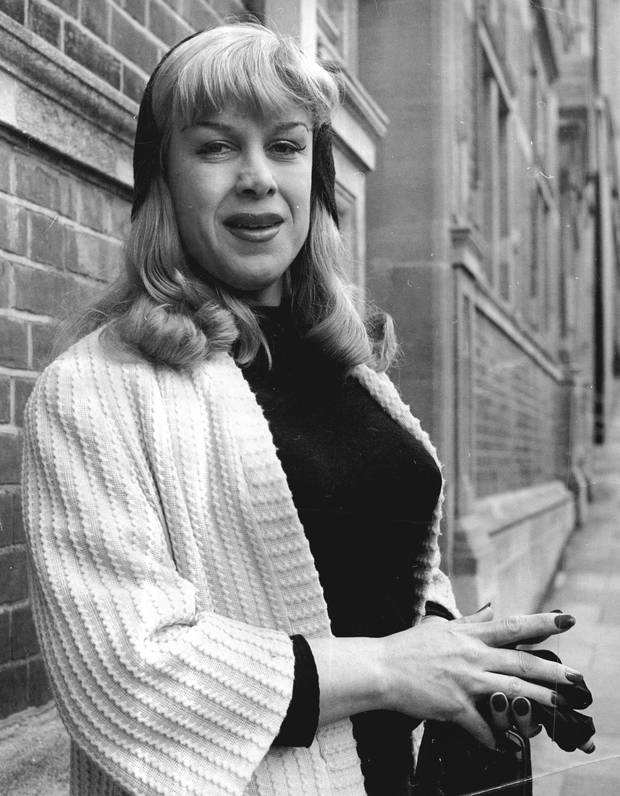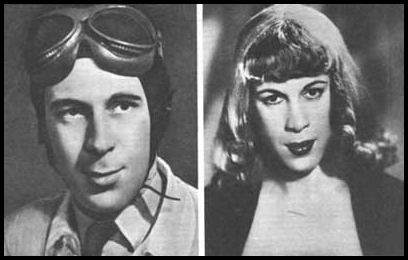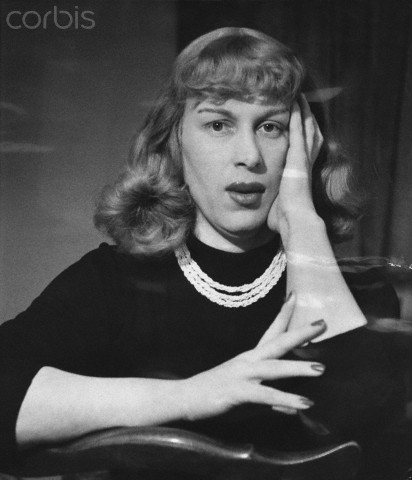Roberta
Cowell (1918-2011)
|

Roberta "Betty" Cowell (born
as Robert Cowell) was
the first known
person in Britain, and among the first in the world, to undergo
pioneering
gender-reassignment surgery, in 1948, before more famous cases such as
April
Ashley and Christine Jorgensen. Before the war, as Bob, she (Cowell
herself
joked in her autobiography that one of the trickiest parts of
undergoing gender
reassignment was knowing which pronoun to use) had been a racing
driver,
competing at Brooklands in Surrey and in the Belgian Grand
Prix.
Later,
Cowell
became a fighter pilot, flying Tiger Moths and Spitfires. When her
plane was
shot down, she was captured and interned in Stalag Luft I
Robert
Marshall Cowell was born
in April 1918, one of three
children of the prominent London surgeon Sir Ernest Cowell and his wife
Dorothy. His upbringing was typical of an upper-middle-class family of
the
period: strict, religious and unforgiving. A chubby child with glasses,
Bob was
nicknamed "Circumference" and "Bottom" at school. He was
left-handed, but forced to write with his right hand.
From
an early age he was
obsessed with cars, and showed
great mechanical ability. He would sneak into the pits of the banked
Brooklands
circuit, near his family home in Croydon, to help the mechanics. He
soon became
a racing driver, and joined the RAF as a pupil pilot in 1935.
In May
1941, he
married Diana Carpenter, who he had met at London University. She was
also a
racing driver, and like him had a degree in engineering. They had two
daughters: Anne was born in July 1942, Diana in August 1944.

So far,
so conventional. What
happened in the years
immediately after the war was anything but. In the autobiography she
published
in 1954, Roberta describes a feeling of restlessness and
dissatisfaction, and a
sense that her life was "pointless and empty". She began to realise
that
her excessively masculine life up to that point had been an attempt to
hide
"what I knew deep down inside me though not consciously: my nature was
essentially feminine and in some way my world was out of joint". Months
of
psychoanalysis and tests confirmed that "my unconscious mind was
predominantly female".
Physically, she also felt
different. She was examined by a
Harley Street sexologist, who gave his opinion that her body showed
prominent
feminine sex characteristics: "wide hips and narrow shoulders, pelvis
female
in type, hair distribution and skin female in type". Other female
traits
included "the absence of laryngeal relief (no Adam's apple) and a
tendency
of the lower limbs to converge towards the knees.
 |
My
breast formation
was
examined and judged to be typically feminine though very little
developed." The origin of these
discrepancies is unclear. Whether she
was born with them, or whether, as she suggests, they were caused by "a
series of emotional upsets", is impossible to know. |
In her book, Cowell
explains that she had a unique medical condition that meant she was
essentially
a woman in a man's body. But amid the ignorance and confusion
surrounding
intersexuality, other theories abounded. Anne and Diana recall being
told that
Bob had changed sex as a money-making scheme. "Our father was always
coming up with business ventures," says Anne. "I remember our uncles
and aunts said he did it to make money, to sell his story."
Cowell became friends with
Michael Dillon, a physician who
had been born female and was the first trans person to undergo
phalloplasty.
Dillon performed the initial operation on Cowell to remove her
testicles, in
1948, which was illegal at the time. This allowed her to be certified
by a
gynaecologist as intersex, and for further surgery to be carried out.
On 15 May
1951, she had a vaginoplasty, conducted by Sir Harold Gillies, a
leading
pioneer in plastic surgery.
Cowell
died on 11 October 2011.
Her funeral was attended by
only six people and (on her instructions) was unpublicised - her death
was not
publicly reported until two years later, when a profile of her was
printed in
The Independent newspaper in October 2013.
Roberta
Cowell (8 april 1918 –
11 october 2011)
'It's
easier to change a body
than to change a mind': The
extraordinary life and lonely death of Roberta Cowell
Roberta
Cowell
It's
easyer to change a body than to change a mind
Als je
een aanvulling of opmerking hebt over deze site dan kun je een
mailtje sturen naar Transarchief
|



